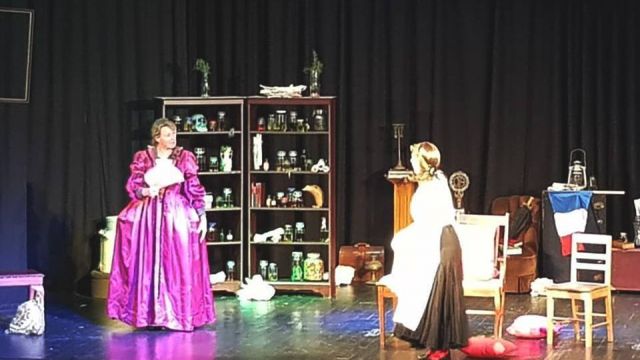The Imaginary Invalid
Molière’s comedies are forerunners to modern farce and also considered Restoration in type, though emanating from France rather than from the traditional English Restoration Era genesis. Key to performing in such comedy is delivering the witty, fast-paced prose well and mastering the satire and absurdity, while never losing the underlying energy. One must also be playful, yet elegant, a difficult compromise.
A well-known Molière comedy, The Imaginary Invalid, is currently being produced by Adelaide’s Blackwood Players. It tells the story of hypochondriac Argan, who wants to marry off his daughter, but only a medical doctor will fit that ‘husband’ bill according to Argan, because such a son-in-law would be an asset to a hypochondriac. Argan’s daughter has other ideas about the sort of man she will marry and so a comedy of errors begins.
First-time director Karina Black and most of the actors in Blackwood Players’ production don’t quite manage to master the mix of skills needed for this type of comedy, although there are good aspects of the production that help make up for this.
 The set is excellent, from the random jars of urine along the front of the stage, to the shelves crammed full of medical potions, to the suspended chandeliers and picture frames. Costumes are also very evocative of the times.
The set is excellent, from the random jars of urine along the front of the stage, to the shelves crammed full of medical potions, to the suspended chandeliers and picture frames. Costumes are also very evocative of the times.
The pervading issue for this production is the slow overall pace, mostly due to rather languid (or perhaps nervous or under-rehearsed) pickup of cues. Lines are also tenuous in some cases. This makes all the difference between an exchange being funny or simply slightly amusing. It could have been corrected by the director during rehearsals but I wonder if the overall period or frequency of rehearsals has been enough. These days, for amateur theatre to begin to be successful, 8-10 weeks with 3 rehearsals per week are vital. Luckily, there are one or two exceptions among the cast in terms of the cue/lines/pace issues.
The actor who singlehandedly lifts the show is Janet Jauncy as Toinette. Jauncy is a delight, with energy to spare, creating a terrific character. The only issue for this actor is a tendency to speak in a slightly shrill, high-pitched voice. Her delivery just needs to be brought back a level and when she does this, her work is momentarily even better.
John Lanigan-O’Keefe is physically perfect in the role of Argan the hypochondriac. However, on opening night there were verbal stumbles and his cues were picked up slowly. Whether responding slowly has been a directorial decision due to the character’s ‘ailments’ or that the issue was uncertainty with lines was not clear, but at times the comedy was lost because of it.
Dawn Ross as Beline, Jessica McGaffin as Angelique and Rebecca Gardiner as Beralde, while doing quite well, could also slightly pick up the pace of their scenes. Hopefully, Adam Schultz’s performance as Cleante will relax and settle as the season moves on, but he was rather forced and noticeably self-aware and not completely in character on opening night. This comedy, as for all theatre, needs actors who can unselfconsciously abandon themselves to the characterisation of their roles, from the moment they step on stage.
 Tammy Shields as Louison, Natalie Kennedy as Monsieur Purgon and Alice Connelly in her dual roles as Madam Fleurant and Monsieur deBonnefoi each bring much needed energy and delight to the stage in their performances.
Tammy Shields as Louison, Natalie Kennedy as Monsieur Purgon and Alice Connelly in her dual roles as Madam Fleurant and Monsieur deBonnefoi each bring much needed energy and delight to the stage in their performances.
Roland Lever as Monsieur Diafoirus obviously enjoys the role even though his grasp of his lines seems tenuous, an issue that in his program bio he appears to recognise and even find amusing. Not a successful portrayal, unfortunately.
A young actor to watch is Alexander Borley as the ‘arranged’ prospective husband and medico, Thomas Diofoirus. Borley shows insight into the nuances of that character, a very good achievement for his first stage role.
This production has good elements. All it needs now is pace and confidence and the laughs should be well and truly rolling as the season continues.
Lesley Reed
Subscribe to our E-Newsletter, buy our latest print edition or find a Performing Arts book at Book Nook.

